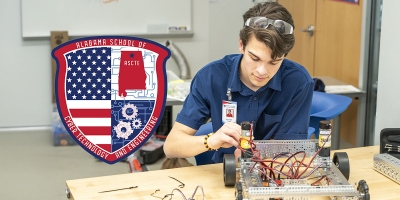
When Buddy Watson was in eighth grade at a small school in rural Alabama, he shared his enthusiasm for engineering with a coding instructor. That conversation led to a pivotal moment in his life: he learned about a new cyber and engineering school opening in Huntsville.
The Alabama School of Cyber Technology and Engineering (ASCTE) claims the title of the first public high school in the U.S. solely focused on cyber technology and engineering, and Watson was among its early freshmen.
“I probably couldn’t sleep for 72 hours after learning about it. I had to follow my dream, despite the risks,” he recalls, reflecting on his choice to attend a residential school during the uncertainty of the Covid-19 pandemic.
Fast forward three years, and it seems Watson’s decision has paid off. Now a sophomore at Mississippi State University, he’s studying mechanical engineering and Russian, while already completing internships in his field. This path is similar to that of many of his ASCTE peers.
Breaking the Mold
ASCTE stands out as a global leader in innovative education. The school offers tuition-free experiences for over 300 students across Alabama, integrating cyber and engineering principles throughout the curriculum. For instance, history lessons go beyond dates and events, delving into the technological advancements that shaped different eras. Students work collaboratively on hands-on projects in areas like robotics and coding.
“History wasn’t just about dates; it highlighted engineering’s journey from ancient innovations to modern times,” Watson explains. “We examined how machines were created and how they influenced society. Even in U.S. history, we learned about coding and its effects, both beneficial and detrimental.”
Teachers at ASCTE include industry experts who bring practical insights to the classroom, covering everything from technical writing to social engineering, to even drone racing.
Statewide Influence
The reach of ASCTE extends beyond its Huntsville campus. Through the Accel program, schools across Alabama receive specialized STEM curricula, and the institution plays a leading role in developing the state’s AI curriculum.
ASCTE has also implemented an “all-child approach,” focusing on the academic, social, and emotional needs of students. This model has gained attention in the state, with ASCTE counselors providing training to peers throughout Alabama.
“When you stumble, you find support from others—a culture of help,” Watson remarks. “Everyone here is here for each other. We want to foster success for all.”
Return on Early Investment
ASCTE not only prepares students academically but also cultivates a talent pipeline that feeds into Alabama’s workforce even before they graduate. Many students have secured internships in engineering, cybersecurity, and related fields, gaining invaluable real-world experience alongside their studies.
Watson works in mechanical engineering both remotely and in-person during the school year. Another graduate, who initially considered a university on the West Coast, decided to stay in Alabama after landing a competitive position with federal agencies.
“The environment at ASCTE encourages students to explore, take ownership, and apply what they’ve learned in practical situations,” Watson notes.
A Glimpse Into the Future?
As Alabama draws significant investments in technology and manufacturing—from Facebook data centers to automotive plants—producing skilled workers is more crucial than ever. ASCTE offers one potential solution to meet these workforce demands, initiating training at the high school level.
Early successes suggest that this innovative educational model could be a viable option for other states facing similar challenges. For now, Alabama seems to have a distinct advantage with its pioneering school.
For Watson, who once hesitated about enrolling in an untested school, the outcomes are telling.
“The environment at ASCTE has allowed us to explore, fail, and try again. That freedom has deeply motivated me to fully commit to engineering,” he shared.
For further information, visit ascte.org.







